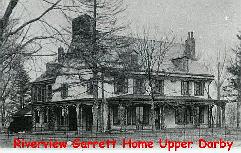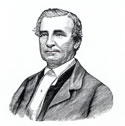 
A Delawarean
 Also see :
 For slaves fleeing north through the Delmarva Peninsula, the last underground railroad station before the Pennsylvania line and freedom was the Wilmington, Delaware home of " Thomas Garrett ", a Quaker merchant. Born on August 21, 1789 in Upper Darby, Pennsylvania, " Thomas Garrett " was one of the most prominent figures in the history of the Underground Railroad. He has been called Delaware's greatest humanitarian and is credited with helping more than 2,700 slaves escape to freedom over a forty year period.
When he was a child his parents actively hid runaway slaves in their Delaware County, Pa. farmhouse. " Garrett " was raised with the teachings of tolerance espoused by his church, one of the first to openly challenge the rights of slaveholders. When " Garrett " was a young man, an employee of the family was kidnapped and nearly forced into slavery. " Garrett " chased after the offenders, freeing his family's friend. According to scholars, " Garrett " experienced a spiritual awakening that day, and would ever after devote his life to the active quest for human equality and dignity.
In 1813, he married Margaret Sharpless who died after the birth of their fifth child in 1828. It was during their marriage that " Garrett " decided, in 1820, to devote his life to abolitionism. Over the next four decades he helped more than 2,000 blacks reach freedom. In 1830 after Margaret's death, " Garrett " married Rachel Mendenhall, the daughter of a fellow Quaker abolitionist from Chester County, Pennsylvania. They had one child, Eli, together and remained married for 38 years.
" Garrett " relocated to Quaker Hill in Wilmington, Delaware and maintained an inconsistently successful hardware business there. He was now living at the geographical and political crossroads of the country, the dividing line between the north and south. Whether he chose his location because of his abolitionist ambition, or found himself aiding almost daily in the escape of fugitives because of his move to the border state of Delaware, " Garrett " soon became known in anti-slavery circles as a great " Station Master " on the eastern line of the Underground Railroad. Fugitives made their way through the lowlands and swamps of Maryland and Delaware, sometimes with the aid of " Conductors ", like " Harriet Tubman ", who worked with " Garrett ". Often helped by support networks in the free black, and white anti-slavery communities, many runaways were directed by signal or word of mouth to make for the house of " Thomas Garrett ".
" Garrett " was able to secret thousands away to the Philadelphia Anti-Slavery Offices, where a free black man named " William Still " had quickly risen to become a formidable freedom fighter and " Station Master ". Still kept meticulous records of slaves' experiences, and was often able to reunite entire families in the free states. Still even found one weary fugitive to be his own, long lost brother.
In 1848, " Thomas Garrett " and a fellow abolitionist " John Hunn " were tried and convicted in the New Castle Delaware Courthouse by U.S. Supreme Court Chief Justice Roger B. Taney for aiding in the escape of the Hawkins family, who had been slaves in Maryland. Both men were given considerable fines which rendered them nearly bankrupt. In his closing address, Garrett regaled those in the courtroom with a redoubled commitment to help runaway slaves. He said to Judge Taney:
" Thou has left me without a dollar, ..... I say to thee and to all in this court room, that if anyone knows a fugitive who wants shelter ..... send him to Thomas Garrett and he will befriend him. " Eyewitness accounts detail the particular contrition of a slave-holding juror from southern Delaware who rose to shake " Garrett's " hand and apologize at the close of the impassioned speech. Following the Civil War, " Garrett " continued his work for minority groups in America. In 1870, when black Americans were given the right to vote by the establishment of the 15th Amendment, " Garrett " was carried on the shoulders of his supporters through the streets of Wilmington as they hailed him " Our Moses ".  Less than one year later, on January 25, 1871, " Thomas Garrett " died. His funeral, attended by many of the black residents of the city, featured a procession of " Garrett's Coffin " ~ borne from shoulder to shoulder up to his final resting place, still marked by a humble stone, in the cemetery at the Wilmington Friends Meeting House at 4th and West Streets in Quaker Hill.
A marker was unveiled in August, 1993 at 4th and Shipley Streets in Wilmington, De. in honor of " Thomas Garrett, Stationmaster of the Underground Railroad " His home is no longer standing. Visit the below " Great Websites " :
" Thomas Garrett " ~ Station Master To see " Thomas Garrett's online Burial Site "
" William Still " ~ Station Master To see the " William Still's online Burial Site "
John Hunn ~ " Click Here ! " Also see:




Email any questions or comments to:
|









